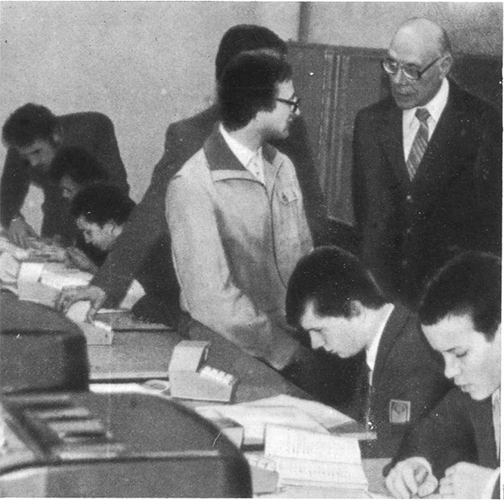About E.N. Sokolov

E.N. Sokolov in the year 1923
- September 23rd 1920. E.N. Sokolov was born in Gorky (Nizhny Novgorod) in the family of a military worker and a government employee.

School years, 1935
- 1939 Graduated with honors from Public High School #2 in Nizhny Novgorod

During war, 1943
-
1940 Enrolled in Nizhny Novgorod Institute of Industry (currently, Nizhny Novgorod State Technical University), specializing in naval engineering.
-
1940 Enlisted in the Red Army and began his military service during the Winter war.
-
1941-1945 Fought in the Second World War on the Western, Kalinin, 2nd Baltic-state and 1st Belarusian fronts, served as an interpreter in the intelligence divisions. Concluded his participation in the war near Warsaw. Was awarded the Order of the Red Star and the Order of the Patriotic War.

First year in Lomonosov Moscow State University, 1950
-
1945-1946 Got an external degree in contemporary German language from Maurice Thorez Moscow State Pedagogical Institute of Foreign Languages (currently, Moscow State Linguistic University).
-
1947 Enrolled in the doctoral programme of Psychology section of the Institute of Philosophy, USSR Academy of Sciences. Worked on his doctoral thesis in the psychological labs of Prof. Sergey Vasilyevich Kravkov (1893-1951).
-
1950 Defended the doctoral thesis in philosophy entitled “Problems of psychology of perception in the context of Pavlovian conditioning”. The thesis included the studies on the mechanisms of visual perception within the framework of topics of S.V. Kravkov’s lab.
-
1950 Boris Mikhailovich Teplov (1896-1965) invited E.N. Sokolov to work at the Department of Psychology, Faculty of Philosophy, Moscow State University (MSU). E.N. Sokolov worked in the lab of Sensory Receptors at the Department of Psychology. His studies addressed the sensory processes that underlie the occurrence of elementary (primary) sensations of light and sound. Later, they were further expanded by the studies of orienting response. E.N. Sokolov continued working on those topics in collaboration with the Department of Physiology of Higher Nervous Activity of the Faculty of Biology (MSU).
-
1953 Alexander Romanovich Luria (1902-1977) invited E.N. Sokolov to work in the labs of the Institute of Defectology, USSR Academy of Pedagogical Sciences (currently, Russian Academy of Education). The labs employed objective methods of registering vegetative and electroencephalographic reactions in diagnostics of vision and hearing impairments. E.N. Sokolov and his colleagues studied the mechanisms of perception and orienting activity, along with the interaction of the two signal systems in normal and pathological conditions.
-
Summer 1954. By a recommendation from Alexey Nikolaevich Leontyev (1903-1979), E.N. Sokolov was included in the delegation that was sent to the 14th Internation Congress of Psychology in Montreal. There, E.N. Sokolov visited the lab of Prof. D. Hebb at McGill University.
-
1958 Publication of E.N. Sokolov’s main monograph, entitled “Perception and Conditioned Reflex”, that was the foundation for his thesis of the Doctor of Sciences title. The monograph gained recognition worldwide and was published in the USA, UK, Japan, Argentina and Mexico.

Stanford University USA
-
1960 E.N. Sokolov taught several courses as a visiting professor at Stanford University USA.
-
1960 Defended the thesis (“Perception and Conditioned Reflex”) for the title of Doctor of Sciences in Biological sciences.
-
1961 Publication of the book titled “The Mechanisms of Memory”. E.N. Sokolov presented the results of his studies in a course that he taught at the universities of Cambridge, Oxford, Sofia, Budapest, and at MIT.
-
1962 Obtained the title of Professor of Psychology.
-
1964 In the Sensory Receptors lab, E.N. Sokolov supervised extended psychophysiological studies on the role of memory in perception. The studies resulted in the description of the habituation effect in a single neuron. They also described two types of conditioning – stimulus-dependent (depends on the information structure) and effect-dependent (depends on the response).
-
1969 E.N. Sokolov began studying neurophysiological mechanisms of conditioning/learning.

Speech during a visit to the Philippines
-
From 1970 E.N. Sokolov conducted multiple psychophysiological studies of visual perception of color, shape and depth.
-
1971 Establishment of the Department of Psychophysiology at the Faculty of Psychology of the MSU. E.N. Sokolov was the head of the Department from 1971 to 2001.

E.N. Sokolov and A.V. Vartanov, 1985
-
1982 During the first International Congress of Psychophysiology (in Montreal), the International Organization of Psychophysiology was established, along with the International Journal of Psychophysiology. Psychophysiology was officially defined as the science about physiological bases of psychological activity and behavior.
-
1984 E.N. Sokolov became a member of the Finnish Academy of Science and Letters. He was elected to the USSR Academy of Pedagogical Sciences (currently, Russian Academy of Education).
-
1984 E.N. Sokolov was awarded the Pavlov Gold Medal Award for the studies of higher nervous activity.
-
1988 American Society for Psychophysiological Research presented E.N. Sokolov with a special diploma “For outstanding contributions to psychophysiology”, which is awarded to researchers whose works of fundamental nature have a significant effect on the development of science.

E.N. Sokolov, M.M. Zimachev and Ch.A. Izmaylov in the lab, 1990s
-
1993 E.N. Sokolov was awarded the Lomonosov medal for high quality of teaching courses and lectures.
-
1995-1996. E.N. Sokolov initiated the establishment of the Center for Magnetic-Resonance studies in the MSU.
-
1998 International Organization of Psychophysiology awarded E.N. Sokolov with the Prize of the Century-1998 (the highest award of the Organization).

E.N. Sokolov, 2006
-
2003 Publication of the monograph entitled “Perception and Conditioned Reflex: New Perspectives”, in which E.N. Sokolov described the main achievements and perspectives of the scientific field that he had created.
-
May 14th 2008. E.N. Sokolov died in Moscow. He was buried at Khovanskoe cemetery in Moscow.
